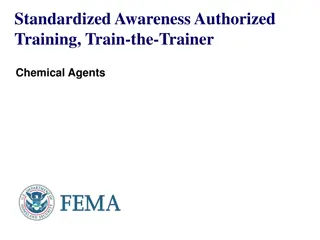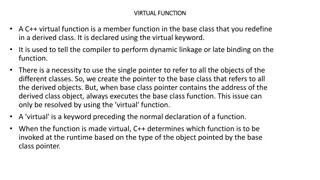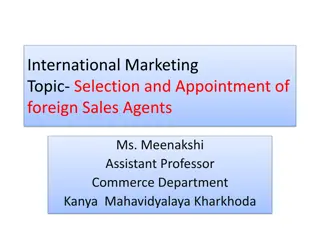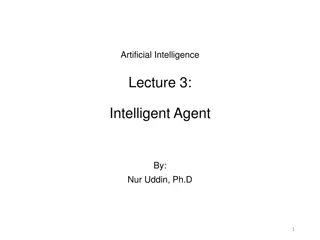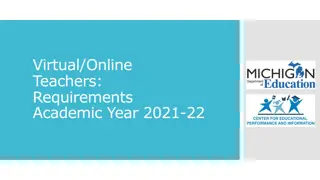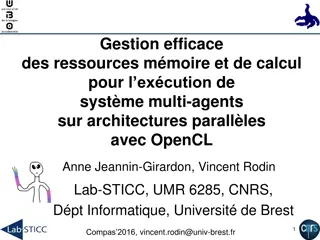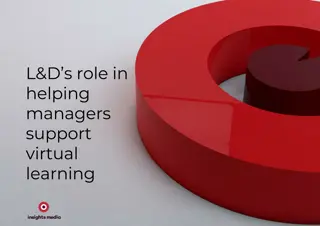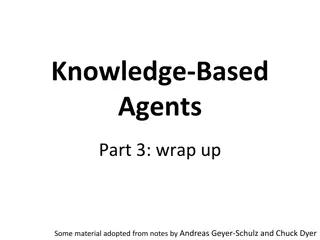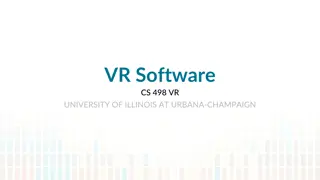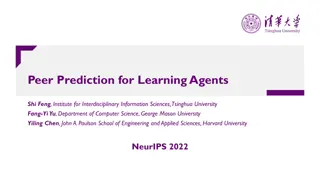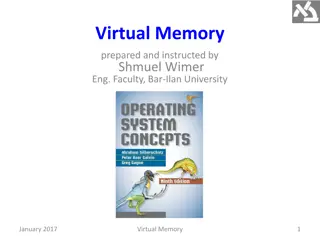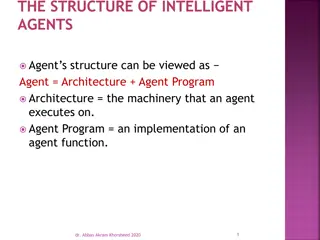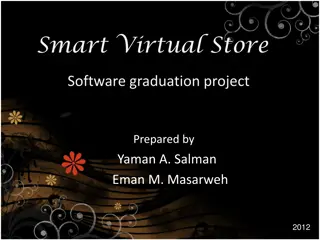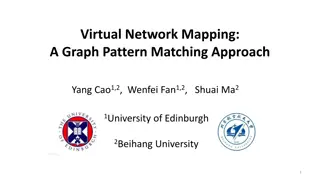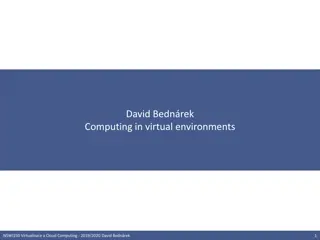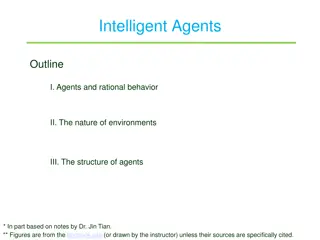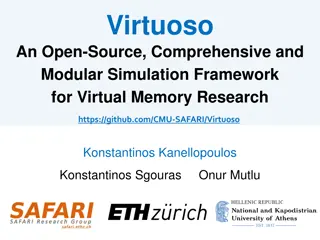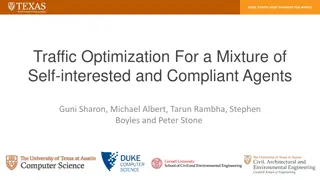Challenges in AI Agents
The common problems faced by AI agents such as lack of memory, unrealistic stories, and inability to proactively find users. Discover how to engage AI agents effectively and address major challenges like multi-modality and cost evaluation.
2 views • 18 slides
Understanding Adrenergic Agents in Pharmaceutical Chemistry
Adrenergic agents play a crucial role in pharmacology by influencing the sympathetic nervous system through adrenergic receptors. These agents, such as sympathomimetics and sympatholytics, impact essential functions like cardiac activity, blood vessel dilation, and insulin release. Adrenergic neurot
0 views • 120 slides
Roles and Responsibilities in Political Party Campaigning and Advertising
Roles and responsibilities in political party campaigning and advertising involve tasks such as soliciting contributions, coordinating fundraising activities, arranging financing, ensuring compliance with electoral budgets and spending limits, managing election expenses, maintaining accounting syste
2 views • 49 slides
Chemical Agents Awareness Training Overview
This training module covers standardized awareness and authorized training on chemical agents, including toxic industrial chemicals, riot control agents, and chemical warfare agents. Participants will learn about the physiological signs/symptoms, advantages/disadvantages of using chemical agents for
1 views • 20 slides
Understanding Virtual Functions in C++
Learn about virtual functions in C++, their importance for achieving dynamic linkage and late binding, rules for defining virtual functions, differences between virtual and non-virtual functions, and examples illustrating their usage. Explore pure virtual functions and their role in creating abstrac
0 views • 7 slides
Important Guidelines for Virtual Care Services in Ontario
Virtual care services in Ontario effective December 01, 2022, require both patient and physician to be located in the province for insurance coverage. Specific codes for assessments and consultations have been updated, and services must follow defined criteria for eligibility. Initiating virtual car
0 views • 15 slides
Exploring Logical Agents and Architectures in Wumpus World
Explore the use of logical agents in the Wumpus World domain through three agent architectures: reflex agents, model-based agents, and goal-based agents. Understand how these agents operate in the challenging environment of the Wumpus World, where the task is to find the gold, return to starting pos
0 views • 21 slides
Selection and Appointment of Foreign Sales Agents: A Comprehensive Guide
Learn about the process of selecting and appointing foreign sales agents in international marketing, including the meaning of agency, content of foreign sales agency contracts, reasons for appointing agents, factors influencing agent selection, as well as the advantages and disadvantages of working
0 views • 12 slides
Understanding Intelligent Agents in Artificial Intelligence
Intelligent agents in artificial intelligence act rationally to achieve the best outcomes in various environments. They operate autonomously, perceive their surroundings, adapt to changes, and pursue goals efficiently. Developing intelligent agents involves examining agents, environments, and their
1 views • 22 slides
Understanding Antineoplastic Agents in Pharmaceutical Chemistry
Antineoplastic agents, such as alkylating agents, target DNA or DNA replication to induce apoptosis in cancer cells. Alkylation of DNA can lead to cell death through various mechanisms, including p53 activation. Resistance to alkylating agents can develop in cancer cells. The process involves nucleo
1 views • 94 slides
Understanding Adjuvants and Herbicide Formulation
Adjuvants are additives that enhance herbicide effectiveness, crucial for optimal weed control. Types include surfactants, stabilizing agents, coupling agents, humectants, deposit builders, and more. Surfactants aid in wetting and spreading herbicides, stabilizing agents keep suspensions intact, cou
0 views • 10 slides
Understanding the Impact of the Tenants Fee Ban on Landlords and Agents
The Tenants Fees Act bans all fees from letting agents and landlords to tenants, impacting the rental market significantly. This article explores what can be charged to tenants, reasons for using an agent, services provided by agents, and insights from landlords on the changing landscape post-ban. A
0 views • 13 slides
Understanding Agency Relationships in Business
Agency relationships in business involve principals appointing agents to act on their behalf. There are different types of agents, such as general agents, special agents, factors, brokers, del credere agents, confirming houses, and commercial agents. Each type of agent has specific roles and respons
0 views • 18 slides
Specialized Virtual Asset Services in Dubai | NH Management
NH Management is a leading virtual asset service provider in Dubai, offering specialized services to facilitate the opening of crypto virtual licenses in the UAE. Whether you\u2019re seeking a virtual license in Dubai or a Dubai virtual business lice
2 views • 8 slides
Requirements for Virtual/Online Teachers in the 2021-22 Academic Year
Legislation in Michigan impacts virtual and online courses, requiring districts to ensure proper teacher placement with valid certifications. Over 75% of sampled school districts had teachers lacking appropriate endorsements for virtual courses. The law mandates direct hire of qualified teachers and
1 views • 26 slides
Revolutionizing Virtual Agent Management with The Dialer Console
Explore a new way to manage virtual agents with The Dialer Console. From starting and stopping campaigns to making dynamic changes to scripts and agents, this innovative tool provides comprehensive control and flexibility. Dive into managing campaigns, controlling agents, changing scripts, and more
1 views • 11 slides
Efficient Resource Management for Multi-Agent System Execution on Parallel Architectures with OpenCL
This research focuses on efficiently managing memory and computing resources for executing multi-agent systems on parallel architectures using OpenCL. The study presents a hybrid approach involving population-level molecular virtual chemistry and individual-level virtual cells. The work enhances a p
1 views • 33 slides
Understanding Intelligent Agents in Chapter 2
This chapter delves into the concept of agents and environments in the realm of intelligent systems. It explores the types of agents, their functions, and interactions with environments. Rationality, performance measures, and the essence of being a rational agent are key aspects discussed. The vacuu
0 views • 28 slides
Understanding Virtual Reality: Types and Uses
Virtual Reality (VR) is a computer-generated environment that immerses users in realistic scenes and objects. This technology is widely used in entertainment, gaming, cinema, amusement parks, and social virtual worlds. There are three primary categories of VR simulations: non-immersive, semi-immersi
1 views • 10 slides
2013 Membership Development Award: Young Agents Committee Success Story
The Young Agents Committee of the Independent Insurance Agents of Georgia, Inc., won the 2013 Membership Development Award for their outstanding recruitment and retention efforts. Their theme focused on perpetuation, increasing active membership by 36%. Through grassroots development, live registrat
0 views • 10 slides
Exploring the Role of Learning and Development in Supporting Managers in Virtual Environments
The role of Learning and Development (L&D) in assisting managers with virtual learning is crucial in today's dynamic work landscape. This article delves into how managers prefer to learn, the impact of virtual working on their learning styles, barriers to optimizing virtual learning, and strategic s
0 views • 27 slides
Understanding Leavening Agents in Baking
This content delves into the importance of leavening agents in baked goods, discussing natural leavening agents, the chemical processes of baking soda and baking powder, the role of yeast leavening, and the differences between quick breads and other baked products. It also covers the leavening agent
0 views • 9 slides
Understanding Knowledge-Based Agents: Inference, Soundness, and Completeness
Inference, soundness, and completeness are crucial concepts in knowledge-based agents. First-order logic allows for expressive statements and has sound and complete inference procedures. Soundness ensures derived sentences are true, while completeness guarantees all entailed sentences are derived. A
0 views • 6 slides
Understanding Agents in OPM Workshop by Luc Moreau
Delve into the concept of agents in OPM Workshop facilitated by Luc Moreau. Explore the nature of agents, their differences from artifacts, causes of their behavior, and challenges in their utilization. Discover the role of enactors, executables, and workflows in generating and controlling agents. U
0 views • 5 slides
Understanding Gastrointestinal Agents: Acidifying Agents, Antacids, Saline Cathartics
Gastrointestinal agents such as acidifying agents, antacids, and saline cathartics are used to manage gastrointestinal disturbances. Acidifying agents like Hydrochloric Acid aid in gastric digestion, while antacids help reduce gastric acidity. Saline cathartics are used as laxatives. Achlorhydria, a
0 views • 36 slides
Virtual Reality Software System at University of Illinois
The Virtual Reality Software System at University of Illinois leverages a Virtual World Generator to create alternative realities using synthetic models or real-world data. Tasks for the Virtual World Generator involve matched motion and user locomotion, while dealing with challenges like collision
0 views • 33 slides
Understanding Peer Prediction Mechanisms in Learning Agents
Peer prediction mechanisms play a crucial role in soliciting high-quality information from human agents. This study explores the importance of peer prediction, the mechanisms involved in incentivizing truthful reporting, and the convergence of learning agents to truthful strategies. The Correlated A
0 views • 7 slides
Understanding Virtual Memory Concepts and Benefits
Virtual Memory, instructed by Shmuel Wimer, separates logical memory from physical memory, enabling efficient utilization of memory resources. By using virtual memory, programs can run partially in memory, reducing constraints imposed by physical memory limitations. This also enhances CPU utilizatio
0 views • 41 slides
Understanding Virtual Worlds and Virtual Property
A virtual world is a computer-moderated environment separate from the physical world, enabling multiple individuals to interact simultaneously. Virtual property refers to objects within these worlds, having economic or sentimental value and deserving legal protection. Virtual crimes like theft occur
0 views • 9 slides
Overview of Intelligent Agents: Structures and Types
The structure of intelligent agents consists of architecture and agent program. Different types of intelligent agents include simple reflex agents, model-based reflex agents, goal-based agents, and utility-based agents. Each type operates based on specific characteristics and methods to make decisio
0 views • 19 slides
Smart Virtual Store Software Graduation Project Overview
Smart Virtual Store Software is a project developed in 2012 by Yaman A., Salman E., and Eman M. to simplify shopping through a virtual store concept. The project includes a QR code generator, QR reader, mobile application, server communication, and a website for easy ordering and purchasing of produ
0 views • 33 slides
Virtual Network Mapping: A Graph Pattern Matching Approach
Virtual Network Mapping (VNM) involves deploying virtual network requests in data center networks in response to real-time demands. It facilitates the deployment of virtual networks on physical machines by mapping virtual nodes and links onto substrate nodes and paths, ensuring constraints are met.
0 views • 15 slides
Exploring Virtual Environments in Computing: An Overview
Virtual environments in computing encompass a range of technologies, from virtual memory to virtual machines and virtual execution environments. These environments allow software to run in a different setting than originally designed, minimizing complexities. Key components include virtual memory, m
0 views • 26 slides
Understanding Intelligent Agents: Key Concepts and Rational Behavior
Intelligent agents operate based on perceptions, reasoning, and actions within various environments. Agents function through a sequence of percepts, utilizing programs to interpret their architecture. The Vacuum-Cleaner World serves as an illustrative environment for agent behavior, highlighting the
0 views • 31 slides
Maximize Virtual Learning with Maalinyai.Cloud.School
Dive into the world of cloud-based education with Maalinyai.Cloud.School. Explore the concept of learning in the cloud, virtual classrooms, and essential tips for virtual lessons. Discover how to make the most of online learning platforms like Zoom, engage students effectively, and create an interac
0 views • 12 slides
Understanding Linux Virtual Memory Management
The memory management subsystem in Linux ensures fair physical memory allocation for running processes, allowing them to share virtual memory when needed. Processes can have separate virtual address spaces or share memory through mechanisms like Unix System V shared memory IPC. Linux uses an abstrac
0 views • 230 slides
Understanding Alkylating Agents in Oncology: Mechanisms and Pharmacokinetics
Alkylating agents have a long history as anti-cancer drugs, with Mechlorethamine being the first developed in 1942. They react with cells in all phases of the cell cycle, causing DNA alkylation and cross-link formation. Common alkylating agents include Cyclophosphamide, Melphalan, and Temozolomide.
0 views • 75 slides
Comprehensive Framework for Virtual Memory Research - Virtuoso
Virtuoso is an open-source, modular simulation framework designed for virtual memory research. The framework aims to address performance overheads caused by virtual memory by proposing solutions like improving the TLB subsystem, employing large pages, leveraging contiguity, rethinking page tables, r
0 views • 29 slides
Traffic Optimization for Self-interested and Compliant Agents
In this study, Guni Sharon, Michael Albert, Tarun Rambha, Stephen Boyles, and Peter Stone explore traffic optimization for a mixture of self-interested and compliant agents. The research delves into routing flows of agents across networks and analyzes equilibrium scenarios. The motivation behind the
0 views • 20 slides
Understanding Antimicrobial Agents and Their Mechanisms of Action
Antimicrobial agents play a crucial role in combating harmful microorganisms. They encompass various categories such as antiseptics, disinfectants, germicides, and bacteriostatic agents. Each category targets different types of microbes and serves specific purposes in maintaining public health stand
0 views • 40 slides



